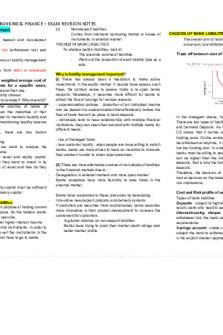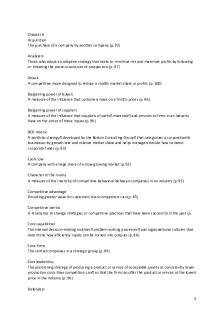Royal Prerogative - Revision notes for exam PDF

| Title | Royal Prerogative - Revision notes for exam |
|---|---|
| Course | Public Law 1 |
| Institution | University of Kent |
| Pages | 3 |
| File Size | 88.6 KB |
| File Type | |
| Total Downloads | 63 |
| Total Views | 187 |
Summary
Revision notes for exam...
Description
Royal Prerogative What is it? -
-
-
-
-
-
-
Dicey’s definition of the royal prerogative – the residue of discretionary or arbitrary authority, which at any given time is legally left in the hands of the Crown. Sir William Wade test for identifying prerogative powers: o Does it produce a legal effect at common law and o Is it unique to the Crown and not shared with other persons Crown Prerogative is the term used to describe powers held by the Monarch or by Government ministers that may be used without the consent of the Commons or Lords. Examples include: o Power to create treaties o Power to create war o Power to appoint ministers The royal prerogatives attach to the Crown. The Government acts in the name of the Crown. The royal prerogatives give the Government a separate legal strand of authority to act, separate from statutory authorisation. Prerogative powers are necessary for the Government to function as it means that decisions can be made in an emergency without having to go through the extensive scrutiny of Parliament. Parliament does have the power to abolish prerogative powers but does not do so as this would limit their powers as prerogative powers allow the Government to make quick decisions in their favour but while exercising the power properly and proportionately without abusing the powers that they have. If these powers were not in force then all decisions and all laws would be left to Parliament which could mean a less just law as Parliament would have an even heavier and lengthy workload to cover everything that the prerogative powers cover, as well as what they have to deal with on a day to day basis. Parliament would be run down, and it could mean that statutes are not sufficient and do not meet the requirements of society. To answer the question ‘what is the royal prerogative?’ one must distinguish the three types of enterprise. o What were the classes of powers, rights, privileges and immunities that were deemed to be the royal prerogative in the past? o Identify a principle that underpins the royal prerogative o The search for a stipulative criteria Queens constitutional prerogatives – the right to encourage, advise and warn o The exercise of these prerogatives was at the faultline of Miller No.2 case Legal prerogatives – the Crown can do no wrong, the Queen cannot be sued in her own court. The Crown is not bound by statute, except by express words or necessary implications. Prerogative executive powers – the making and ratification of treaties, to conduct foreign policy, entering and terminating treaties, governance of overseas territories, deployment of armed forces, appointing and removing ministers.
Involvement with the court -
-
-
-
-
-
-
The role of the court on matters of prerogative powers are limited they may only judicially review certain prerogative powers and the courts role is also to declare what is and what is not a prerogative power in the Government of the day. If it is a purely political decision it cannot be reviewed by the courts e.g. appointing ministers. Only decisions with matters of law can be heard under judicial review and appeal in the courts. Courts have to dig through historical cases to discover if a prerogative power has been previously used and taken to court and what decision was previously made regarding it. There are statutes that declare prerogative powers are still in effect and those that say in it to be removed. In cases where the statutes declare the prerogative power is removed the court will rule it as incompatible with statute GCHQ – established the principle that prerogatives were in principle reviewable but that some prerogatives were potentially non-justiciable. The prerogative to ban trade unions and government communication headquarters. Northumbria Police Authority Case: o The Court of Appeal was asked by the Northumbria Police Authority to grant a declaration that ‘the Secretary of State for Home Affairs has no legal power to issue plastic baton rounds or c.s. gas to a chief constable without the consent of the local police authority, save in a situation of grave emergency’. The Home Secretary had issued a circular making these provisions available, including circumstances in which the Police Authority of an area had refused or were likely to refuse approval to the Chief Constable for such an application to be made to the Home Office. o The case involved three main issues: 1 – did the 1964 Police Act provide a statutory authority for the Home Secretary to maintain and supply these items; 2 – had there been a prerogative power, in essence to maintain the Queen’s peace, that would have covered the Home Secretary’s actions; and 3 – if such a prerogative power had existed, was it displaced by the 1964 Police Act or did it survive the 1964 Act? o The Court held that the Act did so empower the Home Secretary, a prerogative had existed and was not displaced by the Act, so even if the Act did not so empower the Home Secretary his actions would have been empowered under the royal prerogative. Miller 1 and Miller 2: o Both involved issues with the use of the royal prerogative. o Both had to decide if the matter was justiciable, decided it was o Miller 1 – involved the use of the royal prerogative to invoke article 50 to exit the EU without being voted on in Parliament, court decided this was an unlawful use of the prerogative power o Miller 2 – involved the use of the prerogative power to prorogue Parliament for longer than necessary prior to the exiting of the EU, court decided this
was an unlawful use of the prerogative power and Parliament was to immediately resume session. Issues with the royal prerogative -
Prerogative powers need reforming as members of society and those in power remain unclear as to what a prerogative power is defined as and therefore the Government can use this in their favour when aiming to use a prerogative power to bypass Parliamentary scrutiny. It wastes courts time also when having to dig through historical cases to discover if a prerogative power has been previously used and taken to court and what decision was previously made regarding it. Prerogative powers do not necessarily need to be listed they need to be better defined so that they are better understood by practitioners, academics and the general public....
Similar Free PDFs

Royal prerogative
- 5 Pages

Royal Prerogative
- 3 Pages

Royal Prerogative powers
- 2 Pages

Controls on Royal Prerogative
- 3 Pages

Homeostasis Revision for exam
- 11 Pages

Exam revision notes - useful
- 20 Pages

EIM-Exam-Revision-Notes
- 22 Pages

Exam Revision Notes
- 6 Pages

Revision wills - Exam notes
- 17 Pages

Revision exercise for final exam
- 5 Pages
Popular Institutions
- Tinajero National High School - Annex
- Politeknik Caltex Riau
- Yokohama City University
- SGT University
- University of Al-Qadisiyah
- Divine Word College of Vigan
- Techniek College Rotterdam
- Universidade de Santiago
- Universiti Teknologi MARA Cawangan Johor Kampus Pasir Gudang
- Poltekkes Kemenkes Yogyakarta
- Baguio City National High School
- Colegio san marcos
- preparatoria uno
- Centro de Bachillerato Tecnológico Industrial y de Servicios No. 107
- Dalian Maritime University
- Quang Trung Secondary School
- Colegio Tecnológico en Informática
- Corporación Regional de Educación Superior
- Grupo CEDVA
- Dar Al Uloom University
- Centro de Estudios Preuniversitarios de la Universidad Nacional de Ingeniería
- 上智大学
- Aakash International School, Nuna Majara
- San Felipe Neri Catholic School
- Kang Chiao International School - New Taipei City
- Misamis Occidental National High School
- Institución Educativa Escuela Normal Juan Ladrilleros
- Kolehiyo ng Pantukan
- Batanes State College
- Instituto Continental
- Sekolah Menengah Kejuruan Kesehatan Kaltara (Tarakan)
- Colegio de La Inmaculada Concepcion - Cebu





